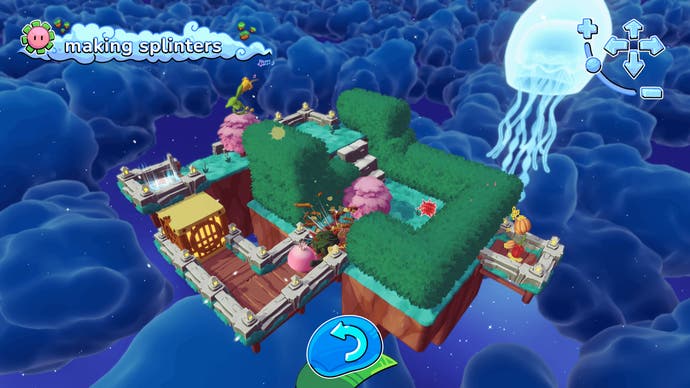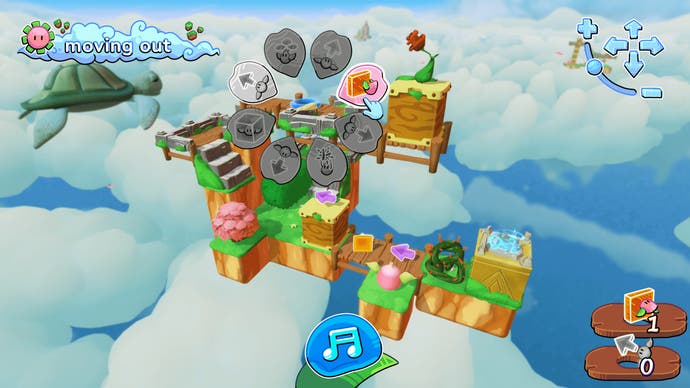Three years ago, everything was about to change for tiny Australian studio Witch Beam. It was gearing up to launch its second game – a game about unpacking boxes and finding a space for your things. Unpacking, it was called. And the hope was that it would build on the success of the studio’s first game, Assault Android Cactus, an energetic twin-stick shooter which did relatively well. But there was trepidation, because how many people would want a chilled-out game about placing objects? How many people would understand what it was trying to do?
Witch Beam needn’t have worried. In just one year, Unpacking raced to a million sales – far, far beyond anything Assault Android Cactus had done. It rocketed the studio to fame. Eurogamer awarded Unpacking Game of the Year in 2021, and Unpacking won awards including two gaming BAFTAs. For Witch Beam, it was an unmitigated success. “It’s been life changing,” co-founder Sanatana Mishra tells me now. “We spent a decade pursuing our creative passion while measuring every tiny decision against the possibility of becoming destitute at the end of that road you go down, and that was a difficult time. We traded on our youth and our health in a way that’s only really possible once or twice in your life. You can’t just keep doing that. And then now, overnight, after 10 years of doing that, we suddenly didn’t have to really think about that part of it any more. So that “It was life-changing for everyone on the team and everyone we work with. It’s been fantastic.”
And now the team is back with a new game called Tempopo.
Tempopo is as different to Unpacking as Unpacking was to Assault Android Cactus. It’s a puzzle game again, yes, but this time it’s about guiding bouncing creatures around dense garden obstacle courses while music bops around you. “Planning and execution is the loop that the game has,” Mishra explains, who created the concept with his friend Seiji Tanaka, who was once an animator on the legendary game Journey. They came up with the idea at a game jam while thinking about “evolutionary dead ends”, of all things. Think sabre-toothed tigers. “Why does that die out but not a different animal?” Mishra asks.
It’s a similar thing with game genres or certain game ideas, in Mishra’s mind. “When I look at these classic games that I love – Lemmings and ChuChu Rocket! – I go, ‘Why are these things no longer interesting to people?’. What decisions did they make that meant – in the way that people expect games to exists now – that game doesn’t work?” And perhaps more importantly, as a follow-on to that thought: “Is there some other way that it could have mutated and been incredibly successful?” That’s where the kernel of Tempopo’s idea comes from. But it wasn’t until Witch Beam co-founder and composer Jeff van Dyck got involved, it really took on the musical shape we see now.
Manage cookie settings
The core of Tempopo should be easy to grasp. You are on a mission to find magical singing flowers and return them to a garden, where you’ll create a kind of soundscape. “Planning and execution is the loop that the game has,” Mishra says. Before the level begins, you issue instructions to plump creatures, and when you’re happy, you begin the level to see if they’ll successfully carry them out. There’s no real-time input. If you want to change something because your plan didn’t work, you start all over again. But there’s no stress.
“I want to try and avoid a problem that I have with a lot of games, especially in the puzzle space, where I feel a huge amount of anxiety playing them,” Mishra says. “I feel judged because I constantly feel I’m not good enough for the game in some way.” He says he hears people say all the time they ‘can’t do puzzle games’ and it irks him. “We’re all really good at puzzle games innately,” he tells me. “It’s literally part of our evolutionary biology. But we constantly feel this kind of anxiety that the game is saying, ‘Oh you should probably solve that a little bit quicker; you should have done that little bit quicker; you should know this – you should know how that works.’ “So I’m trying to put people in this relaxed headspace,” he says. “I want people to sit down with Tempopo and feel a sense of calm wash over them.”



This sense of calm ties into the game’s overriding theme of harmony. It’s there in the musical harmonies you’ll create in your garden soundscape, obviously, but also in the gameplay actions you take, as your bouncing blobs try to help each other overcome puzzles, and in the main character Hannah’s journey through the game. Maybe harmony will also be a theme that resonates with you while you play. “As you gain more understanding of the game and its elements, and you start to think a little bit more about the characters and what they’re trying to do, and understand the plot ahead, you can take that theme and run with it in your head about how beneficial it is,” Mishra says. “I think it’s pretty beneficial, anyway, to think about harmony in this world,” he adds. “It’s not exactly like I’m gonna beat people over the head with it. It’s just an underlying element of this is what the game is about.”
These deeper themes are reminiscent of what Unpacking did so well, which was to be – on the surface – a puzzle game about unpacking boxes and finding space for objects, but beneath that, also be a game telling the story of someone’s life. A story that was gently very moving, which is why it resonated so much with so many of us. But while Tempopo has deeper themes, “It’s quite a different experience,” Mishra points out. It’s worth noting here that Unpacking lead creator Wren Brier is not working on the project. “Wren’s taking a break from development,” Mishra says. “She and Tim [Dawson, the third Witch Beam co-founder] They are partners so they’re living together, still doing things and all of that, but Wren is in desperate need of a break. She was working so incredibly hard on Unpacking, and then it came out and we did various versions on other platforms, and talks and events and different things. Now she is going to recharge before she tackles something new.”
Secondly, Witch Beam never wanted Tempopo to be the same kind of game. They did have discussions about doing Unpacking 2, because people kept – and keep – asking the studio for it, but the discussions never got very far. “We had like a 10-second conversation about it. We were like, ‘We don’t want to do this,'” he says. “We thought it was a complete game that stands on its own.” The idea had been done, in other words, and the studio didn’t want to retread old ground and become known for only one thing. “If anything,” he says, “I’d say our creative brandmark is that there isn’t a singular theme that’s always going to run through everything – it’s totally up to what we find exciting and interesting in the moment.” Usually if someone is passionate enough to carry an idea through to its end, “that’s enough for everybody else to get on board”.
Manage cookie settings
Mishra actually likes Witch Beam’s way of working as an artist’s collective, in how the studio’s core – the three founders – stays the same, but the collaborators on individual projects change. Unpacking’s Wren Brier was technically a collaborator, as is Tempopo’s co-creator Seiji Tanaka. “And we try, based on how the project goes, to make sure that success flows back into the people who work with us,” Mishra says. Unpacking’s success didn’t just benefit Witch Beam, for example, but the broader development scene in Queensland, Australia. “That’s why earlier I said we’re staying small despite our success, because we want to be the ones making the games, and then try to use that success to empower our local developers here to make their games.”
Witch Beam hasn’t bet the bank on Tempopo replicating Unpacking’s enormous success, then, which is a relief. Theoretically I imagine it could operate for years off that game’s income alone. But there’s no escaping the sense of pressure that great success brings. “There’s absolutely that sense that you’ve done a successful thing so now everything else you ever do will be measured against what you did before,” Mishra says. “And that’s slightly terrifying from a creative point of view.” Because if you don’t live up to it – does it mean you fail in some way? It’s daunting. “But whenever I get too focused on that pressure,” he adds, “I think about the fact that’s only coming because we’re in a position anybody would want to be.” He reminds himself: “It’s so incredibly privileged to be in this place.”
Tempopo is in development for PC, Switch and Xbox, and has a loose release target of this year.
#Unpacking #team #wont #sequel #lifechanging #success #game #Tempopo
